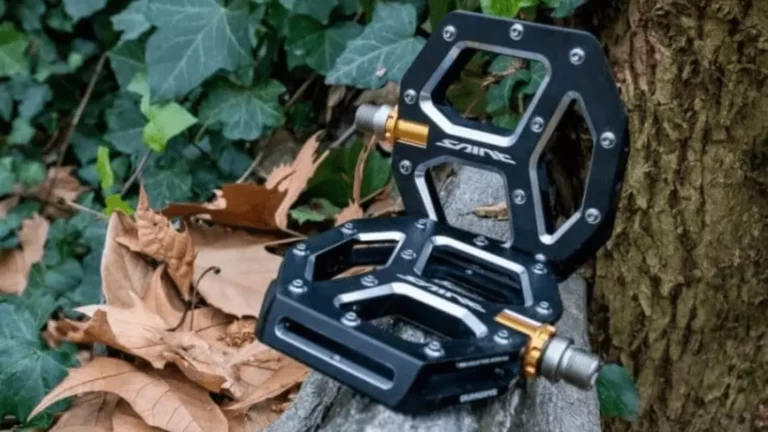Does Weight Matter on a Mountain Bike?

The average mountain bike traditionally used these days weigh around 29 lbs. For many a heavy bike will impact their performance negatively, however, for others, such as cross-country racers, it can be very important in order to maximize pedal performance.
Related Article: Best mountain bike pedals
How does weight matter on a mountain bike?
Cross-country mountain bikes account for the 15 lightest bikes, often weighing about 25.9 lbs. Cross-country bikes are made for maximum efficiency and have a lot in common with typical road bikes. Which means that you waste as little energy as possible and get faster.
The thing that matters the most about weight is that even with the same amount of pedal power, a lighter bike will travel further than a heavier one. This makes lighter bikes more efficient for climbing and endurance.
This means that in instances of mountain biking a lighter bike can result in a much better performance. Then again, there is often a trade-off when it comes to weight saving.
This trade-off is usually financial, shaving off a few ounces or pounds can come at a high cost. The heaviest bikes that there are downhiller bikes, or gravity bikes, which are built to have sleep terrain, big drops, and jumps that need the extra weight to make the bike more robust and efficient in these circumstances.
The weight is important, but it all depends on what kind of mountain bike you are using and what you will be using it for.
See Also: Road bicycle weights
Is 30 pounds heavy for a mountain bike?
A mountain bike that weights 30 lbs is considered to be fairly average. Much as what they are named for, a mountain bike needs to be extremely versatile on the trail, which means it is a full suspension mountain bike, with the added suspension, you can expect an all-mountain bike to be heavier than an average XC bike.
However, a downhill mountain bike can weigh considerably more, as we previously mentioned they do have additional needs.
Then again, you get a 29er, these usually weigh around 28lbs to 30lbs, which is surprising as you would expect their large wheels to add weight, however, they do not. These are popular mountain bikes for XC racers.
Is 32 pounds heavy for a bike?
32 lbs is not considered to be too heavy for a bike. It is considered to be just above medium weight. Depending on what you intend to use the bike for it may be too heavy, especially if you are intending to use it for XC sport, if you are using it for jumps and downhill activities then it may be too light.
It is fairly medium and is still very useable as a mountain bike, being close enough to 30 lbs to be rideable, some may struggle with it, but it is generally a fairly medium weight for a mountain bike.
In terms of other types of biking, a 32 lb bike may be considered heavy, or light. It depends on the type of biking. Lightweight is seen as a sign of quality and speed, but lightweight also means that you may find downfalls when it comes to rougher terrain. 32 lbs is a fairly decent medium, especially for mountain biking.
Is 33 pounds heavy for a bike?
Similar to 32 lbs, 33 lbs is not that heavy. As 30lbs is considered mid-weight across the board for bikes, 33 is in the same bracket of mid-weight. But, similar to other bike weights it typically depends on the bike, what it is made for, and how you like it.
For an XC hardtail, 33lb will be on the heavier side of things. But as an entry-level bike, it may be okay. If you are intending on tackling some hard trails you will likely find 33lbs to work well.
If you are going to be tackling rough terrain, a 33lb bike may work really well as it is not too lightweight that it will struggle, but not so heavy it weighs you down.
In general, a full suspension mountain bike will give you more control and comfort. Generally, people will find that after riding one of these on a lumpy trail it is hard to go back to using a hardtail bike. These bikes traditionally weigh around 30 to 33 lbs.
In comparison, a carbon full suspension trail bike will weigh between 28- 30 lbs. While there is not much difference between the two, it can make a difference to the smoothness of your ride.
Is 34 pounds heavy for a mountain bike?
Typically, no, 34lbs still sits in the average weight for mountain bikes. An average trail mountain bike will weigh anywhere from 31 to 34 lbs if it has full suspension and an aluminum frame, which is beneficial for tackling those bumpier routes.
Once more though, it does depend on your preferences, uses, and the bike itself. Any full suspension mountain bike will weigh up to 34 lbs, However, serious mountain bikers will traditionally go for one slightly lighter, choosing a carbon frame, although this does cost more.
Is 40 pounds heavy for a mountain bike?
Typically, 40lbs is rather heavy for a mountain bike, however, if you are seeking a downhill mountain bike, then it is just right. Downhill mountain bikes are the heaviest full suspension mountain bikes, averaging at 35lbs, however, downhill mountain bikes can reach weights up to 40lbs, and sometimes more.
These are heavier due to their purpose and the conditions that they are used for. You need extra stability and protection for downhill mountain biking and so you will expect extra weight in areas such as the forks, brakes, and frame.
Full suspension adds weight as well, and full suspension is an absolute must-have for downhill mountain bikes.
However, for trail mountain biking, 40 lbs is way too heavy, and you would probably find riding a trail on a 40lb mountain bike a bit of an exhausting workout that you just won’t enjoy. The weight of your bike and its purpose need to correlate and line up in order for you to get the best out of it.
Conclusion
Right now, you should have a clear idea of how does weight matter on a mountain bike. You can learn more by watching the video below. And when you are done, you may be interested in the following article:

Steve Beck is a passionate cyclist and experienced writer covering the cycling industry for over a decade. He has a wealth of knowledge and expertise in all bike-related things, from the latest products and technologies to the best routes and trails. His articles are well-researched, informative, and engaging, and he has a talent for explaining complex cycling concepts in a way that is easy to understand. Steve can be found on the road when he’s not writing about bikes, putting his knowledge and skills to the test.








